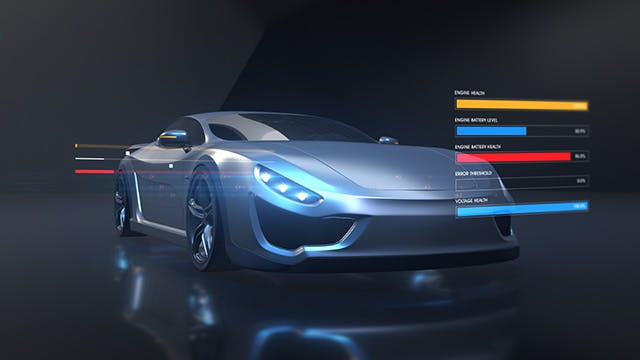A critical challenge in vehicle electrification design is the energy efficiency of the overall electric vehicle, primarily due to the various design choices for a large variety of parameters and conditions. Automotive manufacturers must prioritize thermal management to improve vehicle performance for safety, driving range, passenger comfort, and battery life span.
In this webinar, we will discuss solutions that can analyze thermal management and energy efficiency from component design to overall electric system integration using simulation tools with a digital twin of your electric vehicle. Then, we will detail how Simcenter system simulation helps get results over the EPA 5-Cycles. Register to watch now!
Optimize thermal management in electric vehicles with a digital twin
Simcenter solutions allow vehicle performance engineers to develop a digital twin of their electric vehicle to understand how design choices impact the vehicle's overall system thermal management for optimization. But the challenge for engineers in accelerating the vehicle design and development process is knowing and retaining the right level of high-fidelity results while leveraging fast simulation speed.
Enable efficient workflows in electric vehicle development
Electric vehicle system modeling includes the vehicle powertrain, the electric circuits, and the different subsystems cooling loops. Our Simcenter solutions enable system engineers to develop the vehicle architecture early in the design process, including the battery, power electronics, e-motor thermal management systems, HVAC, and cabin systems.
Use Siemens Simcenter solutions to improve overall energy efficiency
OEM engineering departments must consider climate conditions and dependency on the different vehicle subsystems under real-life driving conditions to improve overall energy efficiency. Using a system simulation solution, OEMs could get results over the EPA 5-Cycles procedure and understand the impact of driving cycles and climate on energy consumption and driving range.
Meet the speakers
.jpg?auto=format,compress)
Sana Loussaief
Business Developer, Simcenter system simulation for vehicle electrification applications
Sana Loussaief has acquired over the past ten years an engineering experience in Multiphysics simulation 0D/1D/3D. She started her career as a simulation engineer focusing on the internal combustion engine and exhaust-after-treatment modeling. She joined Siemens in 2018 as Product Manager for Simcenter system simulation after-treatment and combustion solutions development. Today she acts as a business developer for Simcenter system simulation supporting vehicle electrification applications.

Eric de Hesselle
Engagement Manager for Engineering and Consulting Services
Over the past 20 years, Eric has acquired a diverse background in vehicle and powertrain engineering ranging from assembly plant manufacturing, designing, and developing rubber mount systems to full design and testing hybrid electric powertrain and battery systems. He has specialized his career in NVH and Driveline Dynamics for Hybrid Electric Vehicles. In his current role, Eric has combined his prior engineering design and development experience with strategy and business development to develop custom solutions for Siemens DISW customers.
